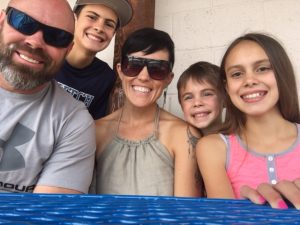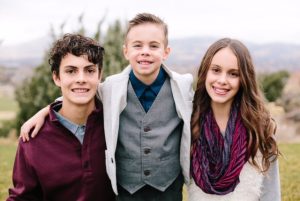I stepped outside the hospital room. I couldn’t stand to see my sweet baby boy that way. Breathing tubes in his nose, pale, gaunt look on his face, glass between him and I. I stepped out of that room with my running shoes on; I was ready to run. Run away from the reality of events that were about to take place. Run away from the grief, though I knew it was impossible.
I was angry with God or whoever made these types of decisions. Mostly, I was mad at myself. Why did I allow myself to love wholeheartedly? Why did I believe that I would be blessed to have a son, a son that I was allowed to raise and keep? I leaned my back against the wall in the hallway of the hospital, slid down to the floor, and sobbed. Please don’t take him, I pleaded. Please don’t take him.
 JD was only nine months old when he spent that one night in the hospital. The doctor never said he was on his deathbed, though he was very sick. I had merely convinced myself that I was not worthy enough to have a child, and since the day he was born, I had anticipated his departure. I didn’t know how, but I knew he would be taken from me at some point. When he became sick, and we rushed him to the ER, I thought to myself, this is it. He’ll never come home with us. JD was born only sixteen months after I placed my baby girl, my little butterfly, for adoption. I was still in the thick of grief, loss, and post-traumatic stress. I didn’t realize the extent of my recurring thoughts of losing JD until this day. I was terrified, as most new mothers would be in this situation, but my emotions were much deeper than that. My feelings of paranoia were as thick as peanut butter and a sense of unworthiness to ever be a mother.
JD was only nine months old when he spent that one night in the hospital. The doctor never said he was on his deathbed, though he was very sick. I had merely convinced myself that I was not worthy enough to have a child, and since the day he was born, I had anticipated his departure. I didn’t know how, but I knew he would be taken from me at some point. When he became sick, and we rushed him to the ER, I thought to myself, this is it. He’ll never come home with us. JD was born only sixteen months after I placed my baby girl, my little butterfly, for adoption. I was still in the thick of grief, loss, and post-traumatic stress. I didn’t realize the extent of my recurring thoughts of losing JD until this day. I was terrified, as most new mothers would be in this situation, but my emotions were much deeper than that. My feelings of paranoia were as thick as peanut butter and a sense of unworthiness to ever be a mother.
As we drove home from the hospital, JD slept peacefully in his car seat. I turned to my husband and said, “I thought we were going to lose him.” My husband squeezed my hand and replied, “He’s ours forever.”
From that day forward, I changed my thought process from one of worry and panic to one of gratitude. Did I still fear that one day something would happen to him? Yes, of course, but I didn’t give it power as I did before. Every morning I’d hear JD giggling and shaking the wood slats on his crib, excitedly waiting for me to come in and pick him up. I’d walk in and see his bright eyes and contagious smile, and I’d send a beam of gratitude that I was allowed another day to be his mother. That doesn’t mean I didn’t get frustrated or overwhelmed as a new mom, but I did know how lucky I was for the opportunity. I was JD’s mother, and it no longer mattered how much time I would be allowed to have with him; it was what I was going to do with that time that mattered.
Having JD never took away that hole that my little butterfly left after placing her for adoption. It remained just as wide and gaping as it was the day she left. Three years after JD was born, my second daughter was born. I thought, finally, a baby girl to fill that hole and void. The fear of losing her was mild compared to the birth of JD and the months after. But it didn’t stop me from being wildly grateful for both of them. As months passed after her birth and my grief persisted, I knew nothing was going to fill that hole, not even another child.
Experiencing grief at such a young age — or any age — brings on a new appreciation for each given day. From the age of nineteen, I knew life was precious. I knew my whole world could change in a matter of seconds, and that made being present in the moment vital to me. After placing my baby for adoption and becoming a birth mother, I knew two things for sure: if I were ever allowed to be a mother again, I would love wholeheartedly, and I was going to become someone my little butterfly could be proud of.
 I have been given more than 5,840 days with my bright-eyed JD, 4,745 days with my beautiful baby girl, and 2,555 with my vivacious youngest son. Had I not started this journey first as a birth mother, I’m not sure I would have known to love as deeply as I do, to appreciate every given day, and to be full of gratitude for my role as their mother. I know my story has not only changed who I am but has also changed the lives of my children. They are fully aware of their sister, who lives in another state. They know they are allowed to ask questions, think about her, long to know her, and love her as I do.
I have been given more than 5,840 days with my bright-eyed JD, 4,745 days with my beautiful baby girl, and 2,555 with my vivacious youngest son. Had I not started this journey first as a birth mother, I’m not sure I would have known to love as deeply as I do, to appreciate every given day, and to be full of gratitude for my role as their mother. I know my story has not only changed who I am but has also changed the lives of my children. They are fully aware of their sister, who lives in another state. They know they are allowed to ask questions, think about her, long to know her, and love her as I do.
Every year, we light the candles on a birthday cake made just for my little butterfly. We all sing happy birthday and talk about what she might be doing at that very moment. Her birthday is a day filled with hope that we might get the chance to watch her blow out her candles. Becoming a birth mother changed everything about my parenting, the way I love, and the way I embrace each new day.
 Growing up in Utah County, unwed pregnancy by age 19, Gina always found herself outside of the Utah cultural box. Shortly after placing her baby girl for adoption in the fall of 2000, she started her own non-profit organization, Birth Mother Baskets. Her goal was to provide hope, support, and courage for birthmothers, post placement.
Growing up in Utah County, unwed pregnancy by age 19, Gina always found herself outside of the Utah cultural box. Shortly after placing her baby girl for adoption in the fall of 2000, she started her own non-profit organization, Birth Mother Baskets. Her goal was to provide hope, support, and courage for birthmothers, post placement.
After fourteen years of running Birth Mother Baskets and being an adoption advocate, Gina stepped away to pursue a corporate job as a Creative Arts Manager.
A severe concussion in 2016 led Gina back to rediscover her true passion for writing. She left the comforts of the corporate paycheck and is now writing a memoir.
Gina still lives in that cultural bubble of Utah County with her husband and three children. She enjoys changing people’s perception of birth mothers and their place in adoption.
You can find her writings at ginacrotts.com or follow her on Instagram at @ginacrottswriter.


